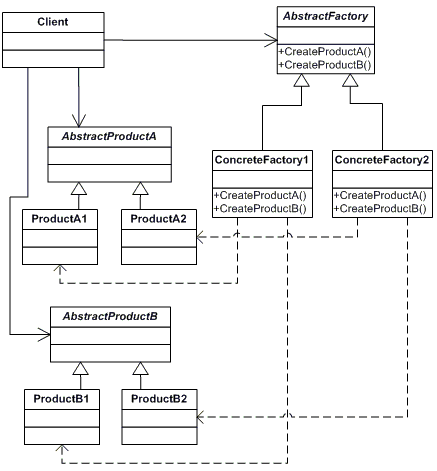Definition
Provide an interface for creating families of related or dependent objects without specifying their concrete classes.
Explanation
The factory determines the actual concrete type of object to be created, and it is here that the object is actually created (in C++, for instance, by the new operator). However, the factory only returns an abstract pointer to the created concrete object.
This insulates client code from object creation by having clients ask a factory object to create an object of the desired abstract type and to return an abstract pointer
to the object.
As the factory only returns an abstract pointer, the client code (that requested the object from the factory) does not know — and is not burdened by — the actual concrete type of the object that was just created. However, the type of a concrete object (and hence a concrete factory) is known by the abstract factory; for instance, the factory may read it from a configuration file. The client has no need to specify the type, since it has already been specified in the configuration file. In particular, this means:
- The client code has no knowledge whatsoever of the concrete type, not needing to include any header files or class declarations related to it. The client code deals only with the abstract type. Objects of a concrete type are indeed created by the factory, but the client code accesses such objects only through their abstract interface.
- Adding new concrete types is done by modifying the client code to use a different factory, a modification that is typically one line in one file. The different factory then creates objects of a different concrete type, but still returns a pointer of the same abstract type as before — thus insulating the client code from change. This is significantly easier than modifying the client code to instantiate a new type, which would require changing every location in the code where a new object is created (as well as making sure that all such code locations also have knowledge of the new concrete type, by including for instance a concrete class header file). If all factory objects are stored globally in a singleton object, and all client code goes through the singleton to access the proper factory for object creation, then changing factories is as easy as changing the singleton object.
Screencast
TypeScript Code
module AbstractFactory {
export class DataServiceFactories {
private static _factories: Object = {};
static registerDataServiceFactory(name: string, creator: () => IDataServiceFactory) {
DataServiceFactories._factories[name] = creator;
}
static getDataServiceFactory(name: string): IDataServiceFactory {
var creator = DataServiceFactories._factories[name];
return creator();
}
}
export interface IDataServiceFactory {
name: string;
getListService(siteUrl: string): IListService;
getListItemService(listUrl: string): IListItemService;
getContentTypeService(siteUrl: string): IContentTypeService;
}
export interface IListService {
siteUrl: string;
getLists(): Array;
}
export interface IListItemService {
listUrl: string;
getItems(query: string): Array;
}
export interface IContentTypeService {
siteUrl: string;
getContentTypes(): Array;
}
}
module AbstractFactory.JSOM {
class JSOMListService implements IListService {
constructor(public siteUrl: string) {
}
public getLists(): Array {
var result = new Array();
/*TODO: use JSOM to fill results*/
result.push("JSOMListResult");
return result;
}
}
class JSOMListItemService implements IListItemService {
constructor(public listUrl: string) {
}
public getItems(query: string): Array {
var result = new Array();
/*TODO: use JSOM to fill results*/
result.push("JSOMListItemResult");
return result;
}
}
class JSOMContentTypeService implements IContentTypeService {
constructor(public siteUrl: string) {
}
public getContentTypes(): Array {
var result = new Array();
/*TODO: use JSOM to fill results*/
result.push("JSOMContentTypeResult");
return result;
}
}
class JSOMDataServiceFactory implements IDataServiceFactory {
private _name: string;
public get name(): string {
return this._name;
}
constructor() {
this._name = "JSOMDataServiceFactory"
}
getListService(siteUrl: string): IListService {
return new JSOMListService(siteUrl);
}
getListItemService(listUrl: string): IListItemService {
return new JSOMListItemService(listUrl);
}
getContentTypeService(siteUrl: string): IContentTypeService {
return new JSOMContentTypeService(siteUrl);
}
}
DataServiceFactories.registerDataServiceFactory("JSOMDataServiceFactory", () => {
return new JSOMDataServiceFactory();
});
}
module AbstractFactory.REST {
class RESTListService implements IListService {
constructor(public siteUrl: string) {
}
public getLists(): Array {
var result = new Array();
/*TODO: use REST to fill results*/
result.push("RESTListResult");
return result;
}
}
class RESTListItemService implements IListItemService {
constructor(public listUrl: string) {
}
public getItems(query: string): Array {
var result = new Array();
/*TODO: use REST to fill results*/
result.push("RESTListItemResult");
return result;
}
}
class RESTContentTypeService implements IContentTypeService {
constructor(public siteUrl: string) {
}
public getContentTypes(): Array {
var result = new Array();
/*TODO: use REST to fill results*/
result.push("RESTContentTypeResult");
return result;
}
}
class RESTDataServiceFactory implements IDataServiceFactory {
private _name: string;
public get name(): string {
return this._name;
}
constructor() {
this._name = "RESTDataServiceFactory"
}
getListService(siteUrl: string): IListService {
return new RESTListService(siteUrl);
}
getListItemService(listUrl: string): IListItemService {
return new RESTListItemService(listUrl);
}
getContentTypeService(siteUrl: string): IContentTypeService {
return new RESTContentTypeService(siteUrl);
}
}
DataServiceFactories.registerDataServiceFactory("RESTDataServiceFactory", () => {
return new RESTDataServiceFactory();
});
}
window.addEventListener("load", function () {
var DataServiceFactories = AbstractFactory.DataServiceFactories;
var restFactory = DataServiceFactories.getDataServiceFactory("RESTDataServiceFactory");
fetchData(restFactory);
var jsomFactory = DataServiceFactories.getDataServiceFactory("JSOMDataServiceFactory");
fetchData(jsomFactory);
});
function fetchData(abstractFactory: AbstractFactory.IDataServiceFactory) {
Output.WriteLine("Fetching data using: " + abstractFactory.name);
var listService = abstractFactory.getListService("sampleSiteUrl");
var lists = listService.getLists();
Output.WriteLine(lists.join("|"));
var listItemService = abstractFactory.getListItemService("sampleListUrl");
var listItems = listItemService.getItems("sampleQuery");
Output.WriteLine(listItems.join("|"));
var contentTypeService = abstractFactory.getContentTypeService("sampleSiteUrl");
var contentTypes = contentTypeService.getContentTypes();
Output.WriteLine(contentTypes.join("|"));
}
Output
